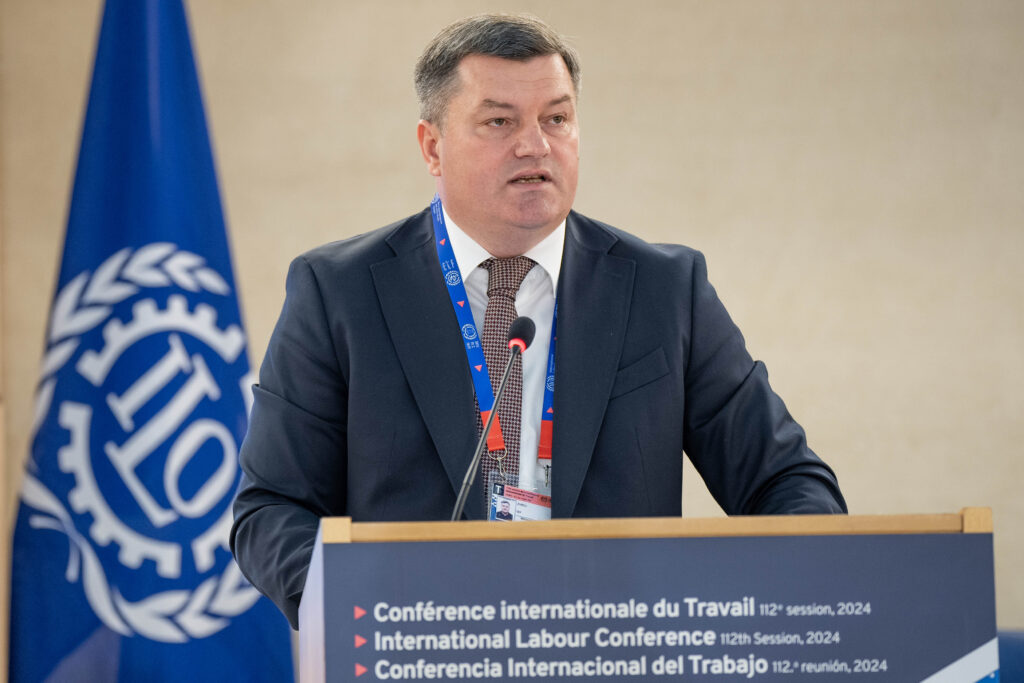The leadership of the National Confederation of Trade Unions of Moldova (CNSM) met on Monday, October 2 with members of the International Monetary Fund (IMF) mission led by Clara Mira, which is in Chisinau from September 25 to October 6, as part of the fourth review of the current cooperation programme with the Republic of Moldova.
At the beginning of the meeting, Igor Zubcu, President of the CNSM, stressed thataccording to the European Parliament Directive on adequate minimum wages in the European Union, the minimum wage in each country must be at least 50% of the average wage. According to the trade union leader, the current minimum wage of 4,000 lei clearly does not ensure a decent living and the state should be guided by the European recommendations on wages in order to increase the living standards of the population and minimize labour migration.
As mentioned, currently, after taxing the minimum wage of 4000 lei, the net salary received by the employee is about 3560 lei. Of which 41 percent (1465 lei) is spent on food. For communal services – 581 lei (in summer time), 300 lei – for shoes and clothing and 1218 lei – for other necessities (health, culture, transport, telecommunications, etc.).
In the case of the Republic of Moldova, 50% of the average wage forecast for 2023 of 11700 lei would result in a minimum wage of 5850 lei.
At the same time, the trade unionists referred to problems related to pay in the budgetary sector. So far, eight reference values for calculating salaries have been maintained, salary increases through the granting of various bonuses and the lack of re-evaluation of the hierarchy of functions and pay grades both by field and in comparison with functions in other similar occupational groups in the system have not ensured the principle of equal pay for work of equal value and a fair pay system.
The CNSM proposes the establishment of a single reference value for all employees in the budgetary sector, in order to avoid cases where employees in the same institution work for different reference values, although their duties are similar.
The trade unionists stressed that pay increases should be made through an actual increase in the basic salary, but not through the granting of various bonuses. At the same time, they stressed that raising the minimum wage is also important for the sustainability of the state social security budget.
During the discussions, the CNSM leadership also referred to the need to revise policies related to personal income taxation. The trade unionists proposed a return to progressive taxation of personal income, which will help ensure social equity and increase state budget revenues.
Another issue discussed at the meeting was the informal economy in Moldova. According to NBS data, in the quarter. II 2023, undeclared work among employees amounted to 8.0% and is increasing compared to Q2 2022 (6.2%).
In this context, the CNSM considers it necessary to develop and adopt a Strategy to combat the phenomenon of informal economy, while bringing the legal framework in line with ILO Conventions No. 129 on labour inspection in agriculture and No. 81 on labour inspection in industry and commerce by excluding the State Labour Inspectorate from the scope of this law, which will allow the conduct of unannounced inspections in accordance with international labour standards, ratified by the Republic of Moldova.
Following discussions with trade unionists, Clara Mira, head of the International Monetary Fund mission, mentioned the need to review national wage policies in order to remove existing inequalities, as pointed out by trade unionists, in a sustainable way for the national economy, through infrastructure development, investment in the green economy, education, health, public services.
At the end of the meeting, Igor Zubcu, President of the CNSM, thanked the high guests for their visit and expressed his hope that it would be auspicious for all citizens of the Republic of Moldova, in order to achieve common objectives aimed at improving the working and living conditions of citizens.

